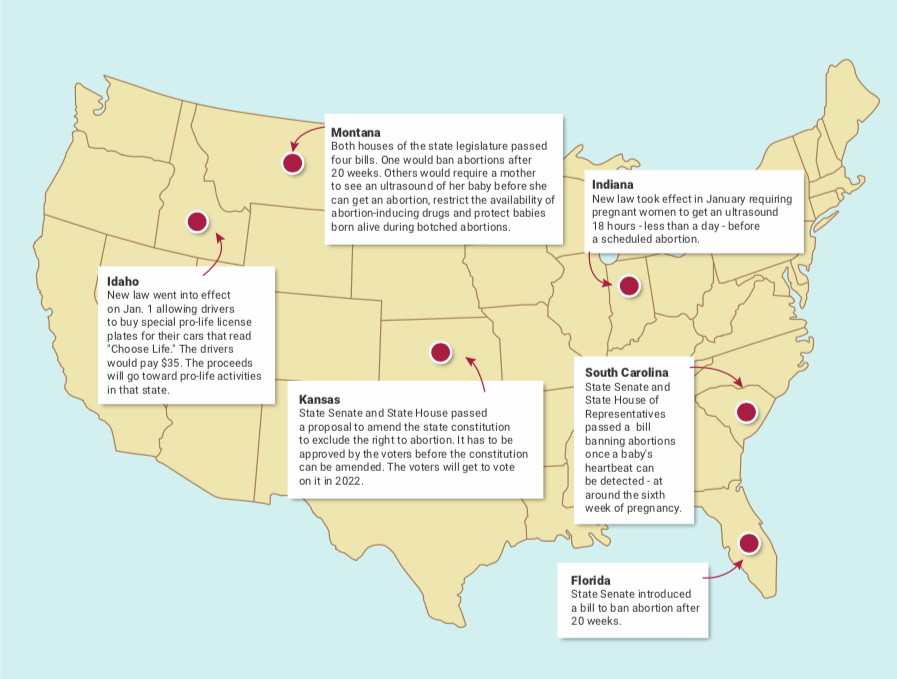Click on the image below to see the full PDF

WINDSOR TERRACE — With a Conservative majority on the Supreme Court in place, state legislatures across the U.S. are taking the opportunity to push pro-life bills.
On Feb. 2, the Kansas Senate passed a proposal to amend the state constitution to exclude the right to abortion. The amendment would mean that Kansas would be codifying in its constitution that there is no recognized right to get an abortion. The Kansas House passed the proposal on Jan. 22.
The proposal will have to be approved by voters before the constitution could be amended. It will be put on the ballot in August 2022.
It’s not clear how a constitutional amendment would be enforced since it would appear to conflict with the U.S. Constitution as interpreted by the Supreme Court’s 1973 Roe v. Wade decision. In that decision, the court ruled that the right to privacy in the 14th Amendment also includes the right to abortion. In cases where a state constitution conflicts with the U.S. Constitution, the federal Constitution prevails, according to Article VI of the Constitution, also known as the Supremacy Clause.
On Jan. 28, the South Carolina State Senate passed a heartbeat bill that Gov. Henry McMaster has indicated he will sign. It would ban abortions once a heartbeat can be detected in a baby — usually around the sixth week of pregnancy.
The bill, which has been endorsed by the Diocese of Charleston, has been sent to the South Carolina House of Representatives for consideration.
“The Roman Catholic Diocese of Charleston fully supports legal protection for unborn children, so we are extremely pleased that the South Carolina Senate, in a bipartisan effort, passed the third reading of the South Carolina Heartbeat Bill,” spokeswoman Maria Aselage said in a statement.
In South Carolina, a bill cannot become law unless it is read aloud on three separate days in each legislative house.
“The bill seeks to accomplish two main goals,” Aselage said. “First, it provides a pre-born child protection from an abortion once a heartbeat is detected. The second goal of the bill is to require that doctors check for the heartbeat of the child so that when a heartbeat is detected, the child immediately receives full protection under the law.”
Montana is another state that is moving forward with pro-life bills. Both houses of the state legislature passed four bills aimed at protecting the unborn. One would ban abortions at 20 weeks — a milestone during pregnancy when studies have shown that a baby can feel pain.
Another bill would require a mother to see an ultrasound of her baby before she would be allowed to have an abortion. The legislature also approved bills to restrict the availability of abortion-inducing drugs and protect babies born alive during botched abortions. Montana Gov. Greg Gianforte pledged to sign the bills.

On Jan. 28, the Florida state senate introduced a bill, the “Protection of a Pain-Capable Child from Abortion,” to prohibit abortions after 20 weeks.
David Prentice, Ph.D., vice president and research director for the Charlotte Lozier Institute, a pro-life research center in Virginia, said medical science backs up the belief that a baby can feel pain at 20 weeks.
“There have been a tremendous number of scientific studies on this. If I put them in a binder that binder would be three, four inches thick,” he said. “There is a reluctance in parts of the medical community to acknowledge it. But the science is there.”
A new law in Indiana went into effect on Jan. 1 that requires pregnant women to get an ultrasound 18 hours before they can get an abortion.
Also as of Jan. 1, drivers in Idaho can purchase special “Choose Life” license plates for $35. The proceeds will go toward pro-life efforts in that state.
States are eagerly looking to see if the Supreme Court takes up Roe v. Wade again or takes up cases designed to chip away at the 48-year-old ruling. With last year’s confirmation of Justice Amy Coney Barrett, a Catholic, the court now has a 6-3 conservative majority.
